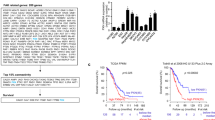Abstract
The p53 tumor-suppressor gene is inactivated in over 50% of all human cancers. In normal cells, p53 induces growth arrest and apoptosis in response to DNA damage. We show that p53 acts as potent tumor-suppressor gene independent of its well-documented effects on tumor-cell proliferation and apoptosis. p53 activates target genes in a murine fibrosarcoma cell-line but does not affect tumor cell-cycle progression or survival. Exogenous expression of wt-p53 does, however, block the angiogenic potential of the tumor cells resulting in formation of dormant tumors in vivo. These data provide evidence that: (1) p53 acts as a tumor suppressor gene independent of its anti-proliferative effects; (2) By inhibiting angiogenesis p53 can indirectly induce apoptosis in vivo but not in vitro; (3) p53-gene therapy which alters a tumors angiogenic potential, can revert tumors to a dormant phenotype.
Similar content being viewed by others
Author information
Authors and Affiliations
Rights and permissions
About this article
Cite this article
Holmgren, L., Jackson, G. & Arbiser, J. p53 induces angiogenesis-restricted dormancy in a mouse fibrosarcoma. Oncogene 17, 819–824 (1998). https://doi.org/10.1038/sj.onc.1201993
Received:
Revised:
Accepted:
Published:
Issue Date:
DOI: https://doi.org/10.1038/sj.onc.1201993
- Springer Nature Limited
Keywords
This article is cited by
-
Tumor dormancy and the neuroendocrine system: an undisclosed connection?
Cancer and Metastasis Reviews (2013)
-
Inhibition of tumor angiogenesis by p53: a new role for the guardian of the genome
Journal of Molecular Medicine (2007)
-
Antiangiogenic gene therapy of cancer: recent developments
Journal of Translational Medicine (2004)
-
Tumorigenesis and the angiogenic switch
Nature Reviews Cancer (2003)
-
Aerosol delivery of PEI–p53 complexes inhibits B16-F10 lung metastases through regulation of angiogenesis
Cancer Gene Therapy (2002)



